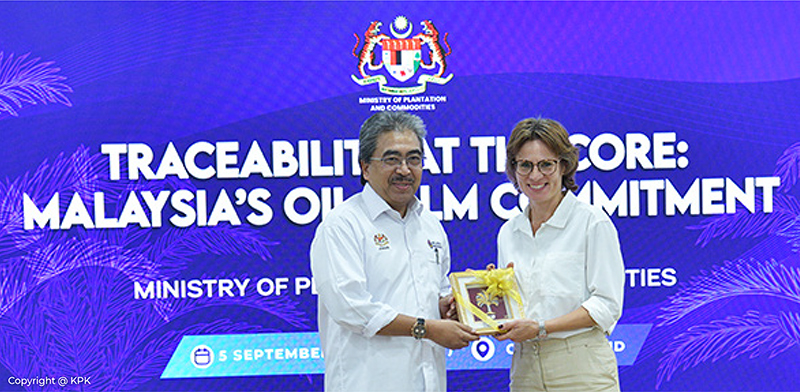Carey Island Visit Highlights Malaysia’s Commitment to Sustainable Palm Oil and Traceability
Malaysia showcases its leadership in sustainable palm oil and traceability through unending efforts in the MSPO certification, smallholder engagement, and the upcoming National Traceability System (SKN).
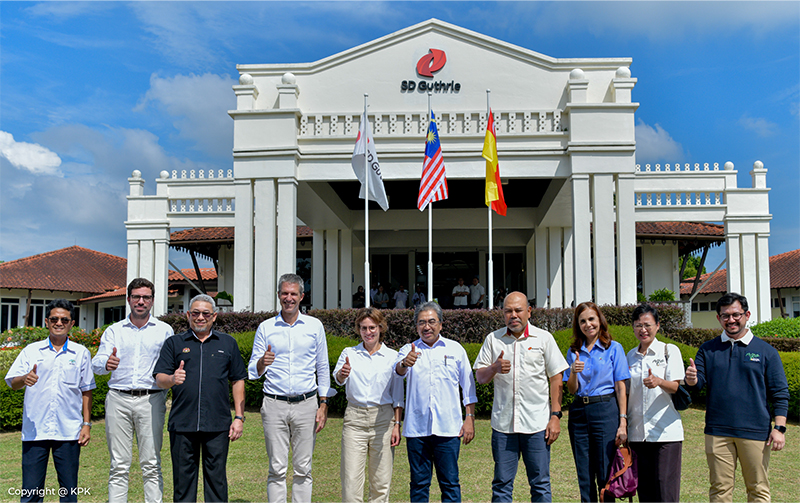
Minister of Plantation and Commodities, Malaysia, YB Datuk Seri Johari Abdul Ghani; European Commissioner for Environment, Water Resilience and a Competitive Circular Economy, Her Excellency Jessika Roswall; European Union Ambassador, His Excellency Rafael Daerr; Secretary General, Ministry of Plantation and Commodities, Malaysia, YBhg. Dato' Yusran Shah bin Mohd Yusof; and MPOC CEO Belvinder Sron with representatives from MPOB, MSPO, and SD Guthrie Berhad at the Palm Oil Experience Centre (POEC).
As part of Malaysia’s ongoing engagement under the Forest, Agriculture and Commodity Trade (FACT) Dialogue, European Commissioner for Environment, Water Resilience and a Competitive Circular Economy, Her Excellency Jessika Roswall, visited SD Guthrie’s oil palm plantation on Carey Island, Selangor. The engagement supports the broader objectives of the FACT Dialogue, a voluntary partnership between producing and consumer countries that aims to promote transparent and deforestation-free supply chains.
Malaysia currently serves as Co-Chair of the FACT Dialogue for the 2025–2026 period, alongside the United Kingdom. The Ministry of Plantation and Commodities leads the country’s participation, reinforcing Malaysia’s role in shaping sustainable agricommodity trade frameworks.
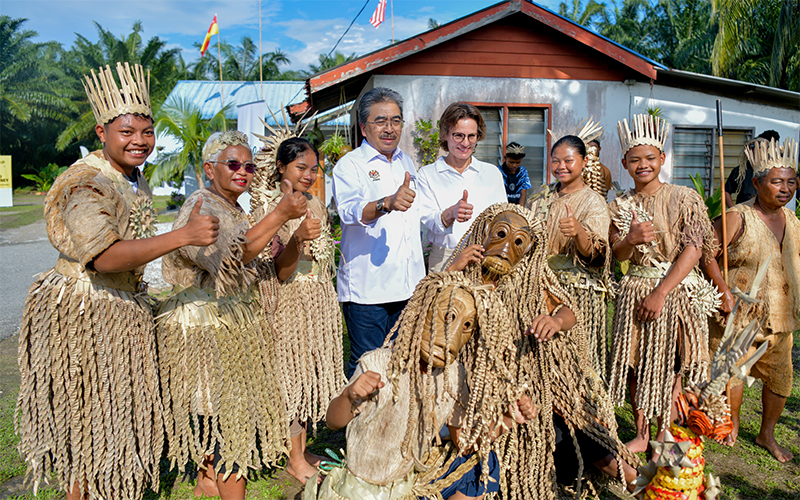
Minister of Plantation and Commodities, Malaysia, YB Datuk Seri Johari Abdul Ghani and European Commissioner for Environment, Water Resilience and a Competitive Circular Economy, Her Excellency Jessika Roswall share a moment with the Mah Meri community in Kampung Sungai Judah, symbolising the harmony between culture, community, and sustainability in Malaysia’s palm oil sector.
Demonstrating Sustainability at Every Level
From field-level regenerative agriculture practices in Kampung Sungai Judah to technical briefings at the Palm Oil Experience Centre (POEC), the visit offered a comprehensive look at how sustainability is operationalised throughout Malaysia’s palm oil sector. These on-ground demonstrations provided a close-up view of the implementation of the Malaysian Sustainable Palm Oil (MSPO) certification, particularly among smallholders and indigenous communities.
At POEC, the programme continued with technical presentations by the Malaysian Palm Oil Board (MPOB), MSPO and SD Guthrie Berhad. These sessions aimed to update stakeholders on Malaysia’s advancements in traceability, certification, and governance, as well as how these systems are being aligned with evolving international requirements, including the European Union Deforestation Regulation (EUDR).
Previewing Malaysia’s National Traceability System
MPOB led a live demonstration of the Sistem Kebolehjejakan Nasional (SKN), a national digital platform designed to enhance palm oil traceability, which is soon to be released.
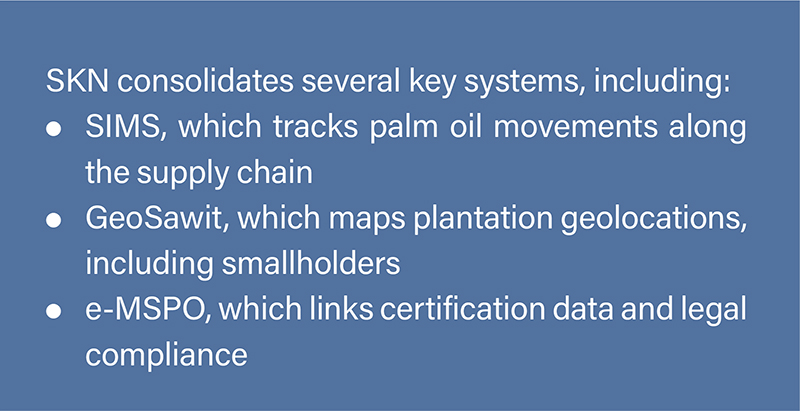
Strengthening Certification and Market Access
MSPO briefing, delivered by CEO Mohamed Hafizin Mohamed Tajudin, outlined the certification scheme’s alignment with EUDR expectations. As a mandatory, government-regulated scheme, MSPO offers third-party verification on land legality, environmental safeguards, and social responsibility. Key elements include:
- Verification of land ownership and legal operating licenses
- A prohibition on conversion of natural forests, protected areas, and High Conservation Value (HCV) areas after 31 December 2019
- Traceable documentation of Fresh Fruit Bunch (FFB) movement, volumes, and transactions
Minister of Plantation and Commodities, Malaysia, YB Datuk Seri Johari Abdul Ghani presents a token of appreciation to European Commissioner for Environment, Water Resilience and a Competitive Circular Economy, Her Excellency Jessika Roswall, during the Carey Island visit.
Its digital system supports traceable FFB movement across the supply chain, a feature noted by the European Forest Institute (EFI) as valuable for EUDR due diligence. While MSPO was not developed initially to meet EUDR, EFI observed that it contains “much information that could be relevant,” including traceability modules and accessible data.
Inclusion and Balance
Throughout the visit, Malaysia’s commitment to inclusive and balanced sustainability was showcased. Dialogues with smallholders and community leaders underscored efforts to implement traceability and certification in ways that preserve rural livelihoods and promote shared responsibility across the sector.
Remarks by the Minister of Plantation and Commodities, Malaysia, YB Datuk Seri Johari Abdul Ghani, emphasised that Malaysia is not seeking exemptions under the EUDR, but rather a fair and evidence-based recognition of existing national frameworks.
Reinforcing Confidence through Transparency
With MSPO certification fully enforced across the palm oil sector and digital tools like SKN, Malaysia demonstrated strong alignment with international sustainability requirements. The Carey Island visit offered a valuable platform for strengthening mutual understanding and enhancing constructive collaboration between Malaysia and the European Union in advancing sustainable palm oil trade.
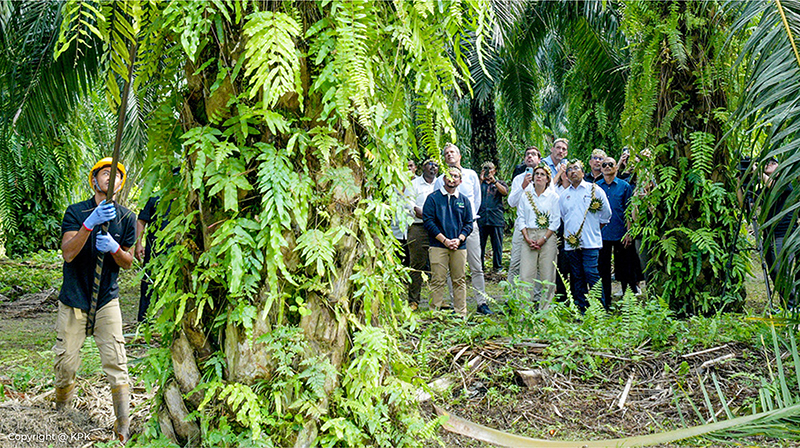
A closer look at the palm oil plantation reveals the community’s responsible farming practices, aligned with the MSPO certification scheme.



